
SRHS
Steamboat Rock Historical Society
A NEW CENTURY
A NEW FARM CROP
A new farm crop came farms around Steamboat Rock in 1911 when sugar beet production was introduced. Sugar beets showed potential as a profitable new crop.
The new industry got started with several area farmers contracting to raise from 25 to 50 acres of sugar beets each season.
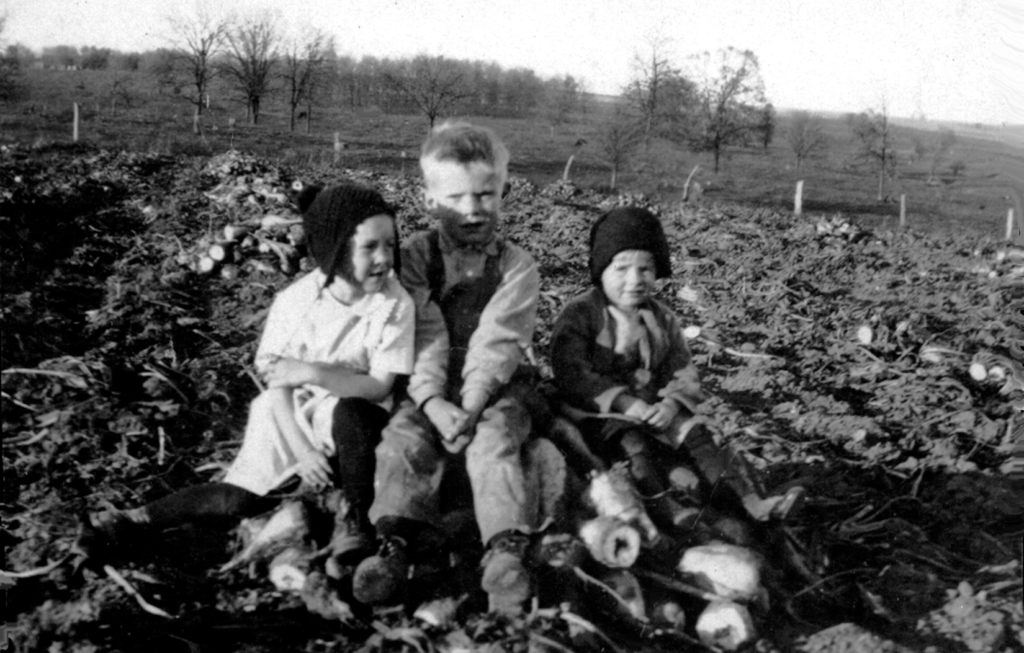
Harry Folkerts (center) and sister Luella (right) with cousin Louise (Luiken) Nederhoff sit on a pile of harvested beets on the Rex Folkerts farm.
A commercial sugar company in Waverly, Mason City and Belmond, sponsored the enterprise and had a general supervisor in the area to look after their interests.
Laborers were brought in from outside the community who were referred to as “beet tenders”. They cared for the beets which the farmers had planted from when they were seedlings to harvest.
Most of these people were foreigners, with a few from distant cities. Most of these people spent the summer in shacks built for living quarters on the farms where the beets were raised. Some of these people integrated into the community, and became respected citizens.
The beets were shipped out by rail and a “beet dump”, an elevator used for loading cars was built the first fall of harvest a hundred yards or so down the track from the depot. When the beets were dug they were brought by wagon to the beet dump, weighed and loaded onto gondola or hopper cars on the side track. The wagon loads would come in faster than the beets could be loaded so they were piled on the ground about where the road to the sewer plant is now. There were many piles about six feet high.
There was a great deal of labor involved in raising and harvesting beets. Beside the planting and cultivating, there was the handiwork of blocking, weeding and hoeing to be done, and then in the fall when the beets were ready to harvest they were loosened in the ground by a “beet lifter” drawn by a team of horses or mules, and then hand workers completed the pulling, topping, and piling the beets in the field.
Beets yielded from 10 to 15 tons per acre. The piles of beets would then be loaded on wagons and hauled to town where they were weighed. sampled and graded and unloaded at the “dump”.
Beet farming continued for several years and an annual “Beet Day” celebration was held to promote the industry.
The following is an article from the Eldora Herold regarding one of these early celebrations.
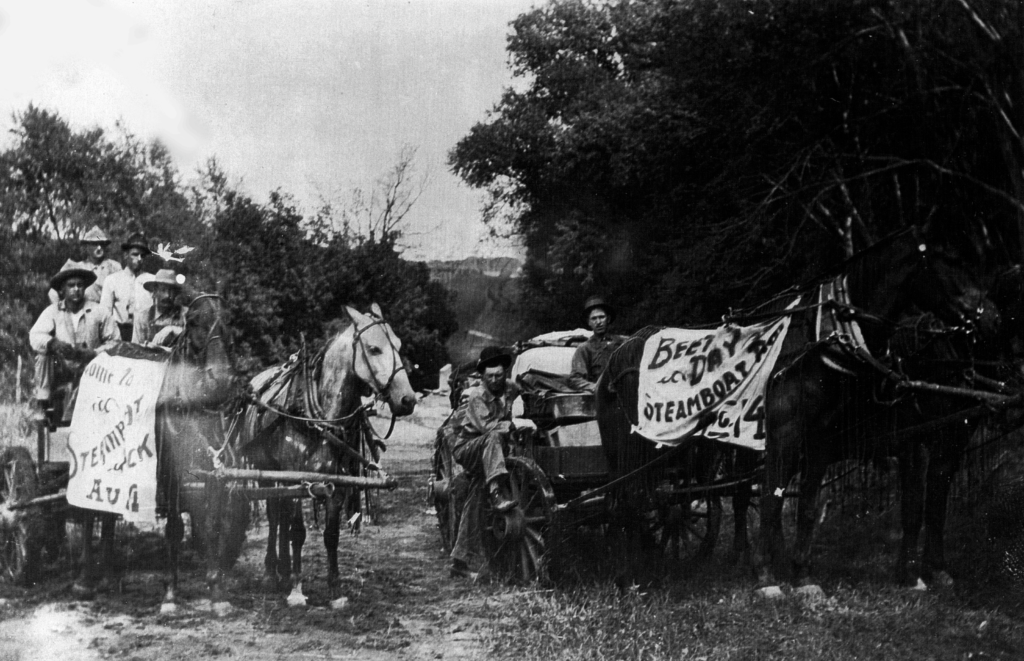
For several years a “Beet Day Celebration” was held in the fall after the beet harvest to promote the raising of sugar beets.
“The third annual Beet Day celebration is a day of the past and was a success. There was quite a crowd, the people coming mostly from the surrounding towns. Although the day was cool there was something doing all the time and everyone seemed to be enjoying himself. The two baseball games of the day proved to be top notchers. In the morning Wellsburg trimmed Steamboat in a hairraising ten inning game to the tune of 8 to 9.
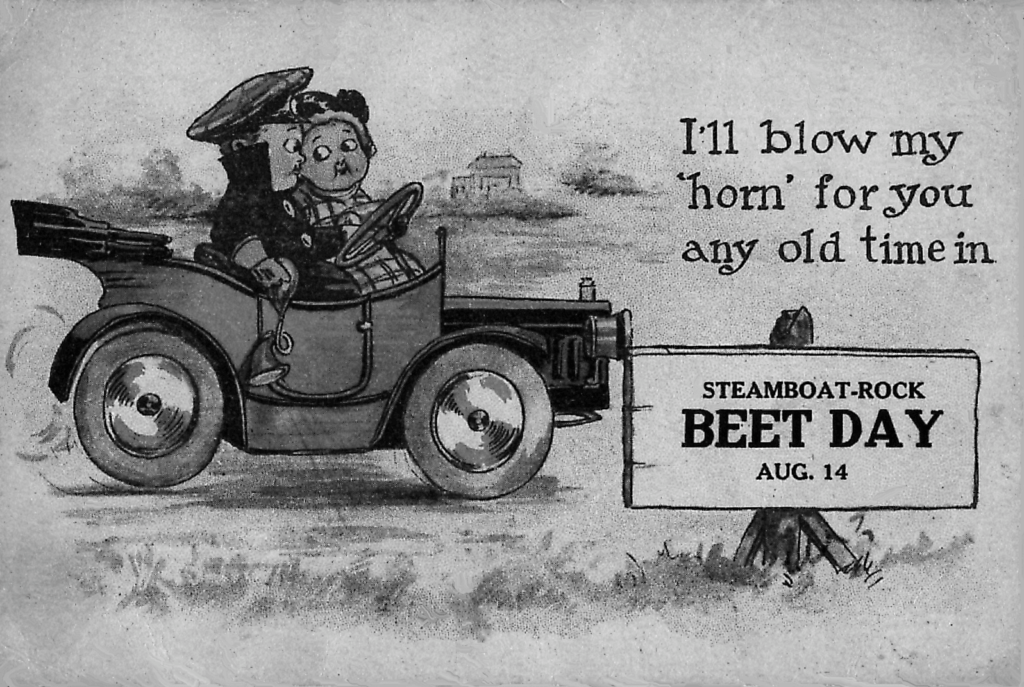
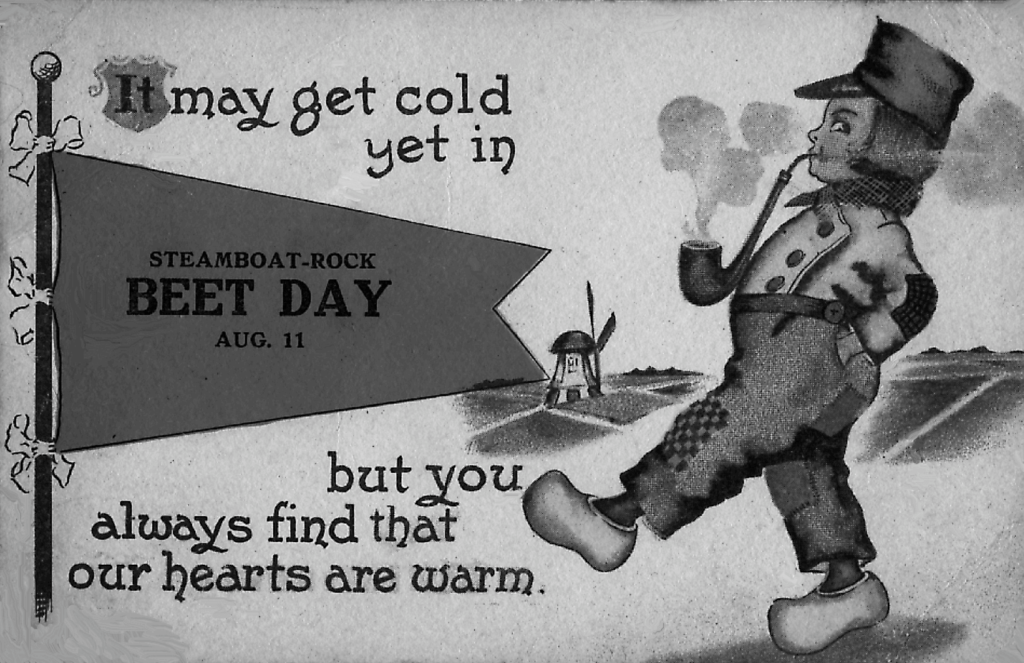
In the afternoon Union defeated the lads from Grundy County in a airtight contest by the score of 4 to 3. The Industrial school band furnished the music throughout the day and gave an enjoyable concert in the evening. No accidents occurred to mar the day and everything went off as per schedule. The officers in charge are to be commended for their excellent efforts.”
Raising beets was interrupted for several years but was started up again a few years later. A different class of people were imported this time mostly of Mexican origin, to do the hand labor.
Farmer’s began to realize by the mid 1920’s that the beets were badly depleting the soil, and most quit raising the crop. Soon there were too few for it to be profitable, and the practice ceased altogether.
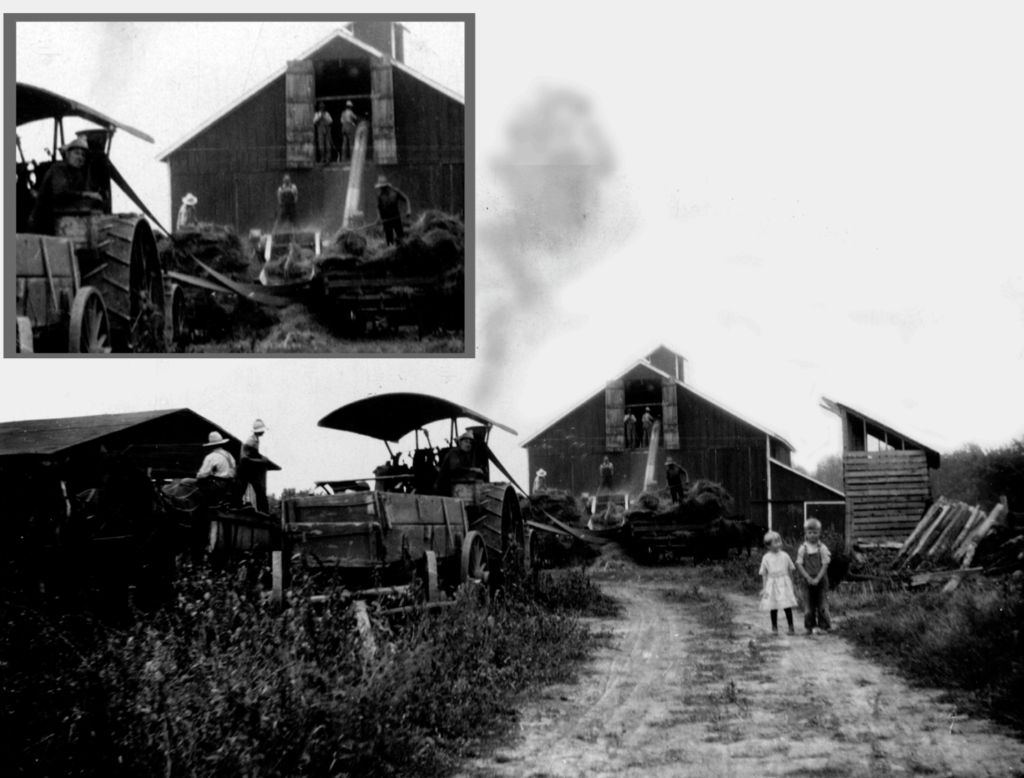
Mike Finger, thrashing in the early 1920’s on the Rex Folkerts farm northeast of Steamboat Rock. Eight men can be counted working in this photo. The children on the right are Luella and Harry Folkerts. The straw is being put directly into the barn. The barn in this picture was once a livery barn in the town of Steamboat Rock. It belonged to the Root Hotel and was located on a lot directly behind the former hardware and implement buildings. It had been taken down and rebuilt in the late 1800’s or early 1900’s by Derk Christians who owned the farm at the time. The barn still stands on the farm now owned by Arnold Luiken.
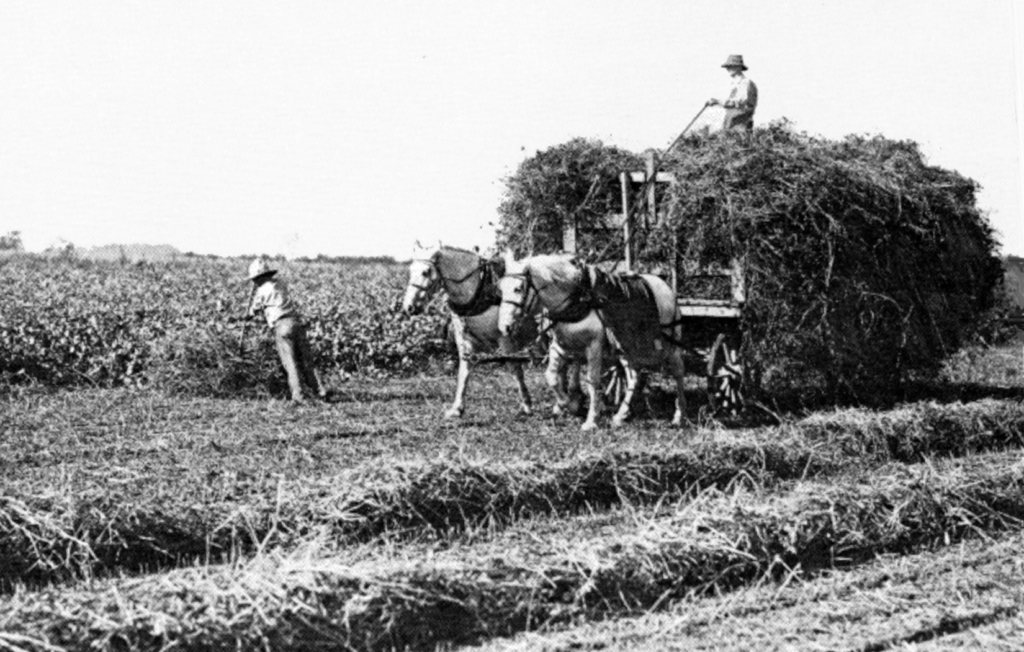
Wheat was now no longer an important crop in the area. Oats and wheat were threshed by hand. Hay was pitched onto wagons and stacked with pitchforks by hand. And, pitching hay by hand was a pleasure compared with other things that had to be pitched.
Crude steam powered threshing machines were now coming on the scene, but they would still require much in the way of backbreaking manpower.
At threshing time the day of the farmer started around 4:30 a.m. The farmer and his sons if any were up were doing livestock chores…feeding hogs, cattle, horses, and milking the cows. Then it was breakfast time. After breakfast, the horses were groomed and harnessed readying them for the bundle wagon they would pull that day. By now the other men of the threshing ring were arriving. Mike Finger, ran a “threshing ring” around Steamboat. His son Bob Finger still lives in Steamboat Rock, and remembers his father’s business.
Bob recalled that his father, owned a threshing machine. The threshing machine was steam powered. The steam engine was on steel wheels with lugs behind. The steamer would pull the separator from job to job and it’s steam whistle could be heard for miles. At each job the engineer would spot the separator and carefully back the engine into the belt and they were ready for business.
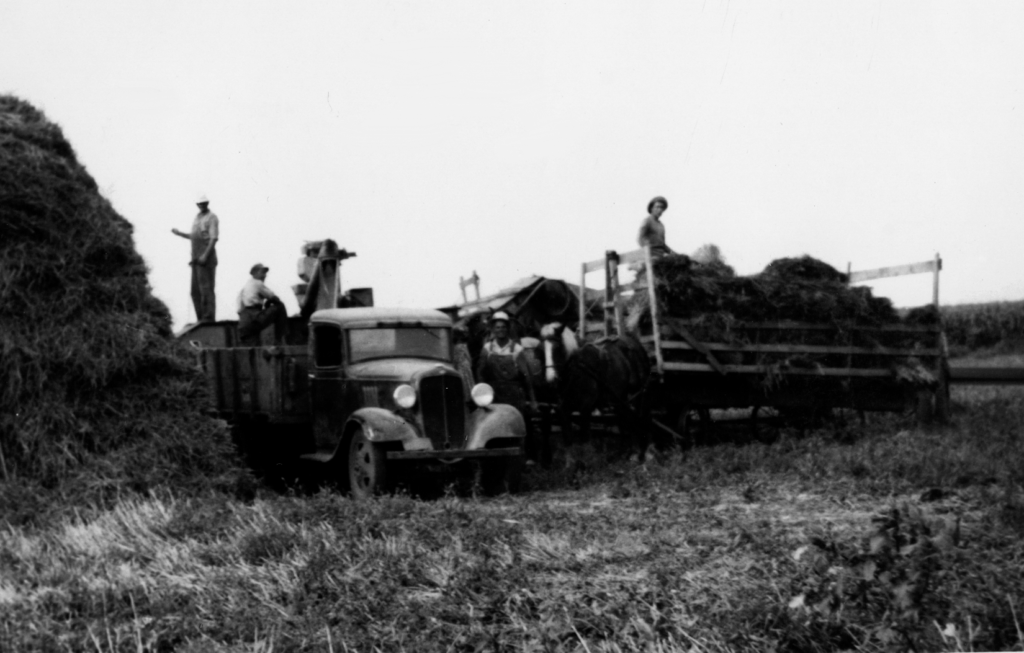
Early 1940’s thrashing on Hie G. Folkerts farm.
Mike went from farm to farm to thresh the oats that had been made into shocks. This had been done by hand. “The practice at that time was for several of the neighbors to make arrangements with the owner of the machine to come and thresh their oats.” Oats were a major crop back then. “Every farmer in the threshing ‘ring’ would arrive at the specified farm with a team, hay rack, and pitchfork ready to help.”
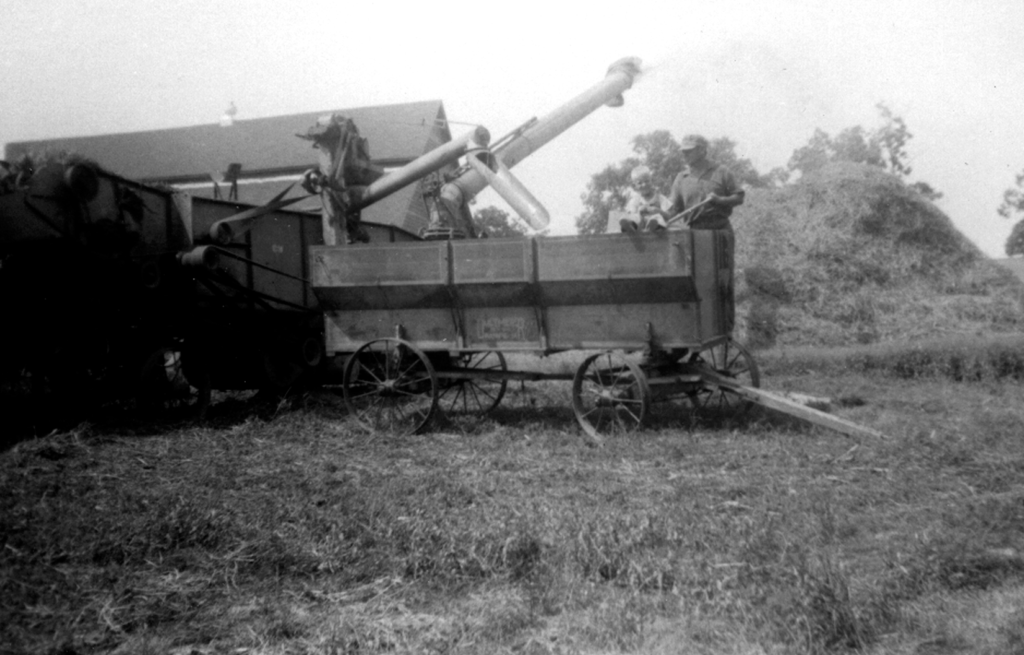
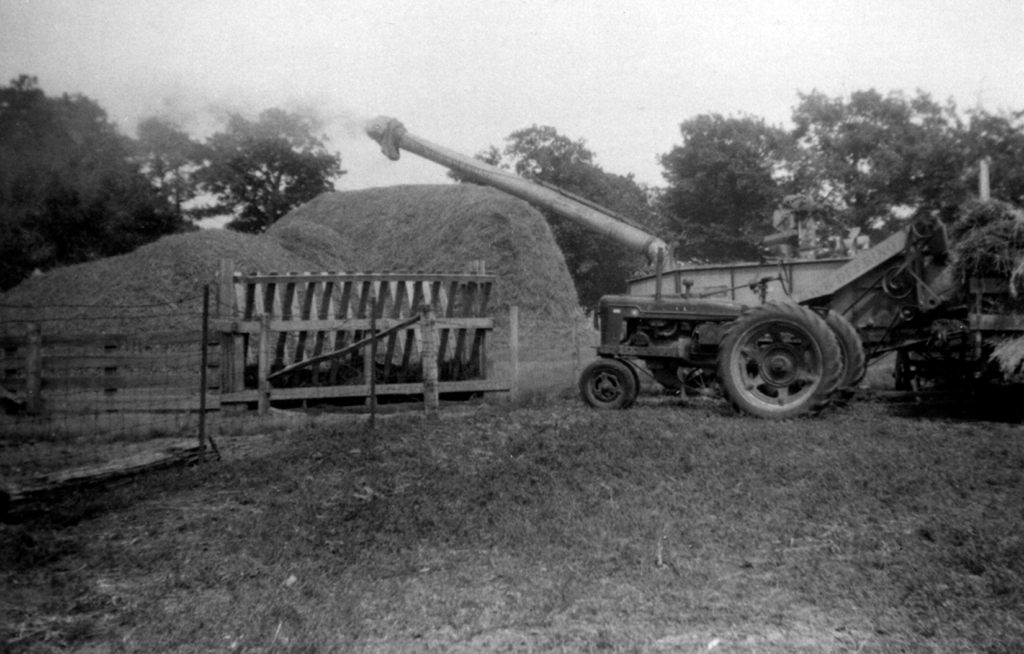
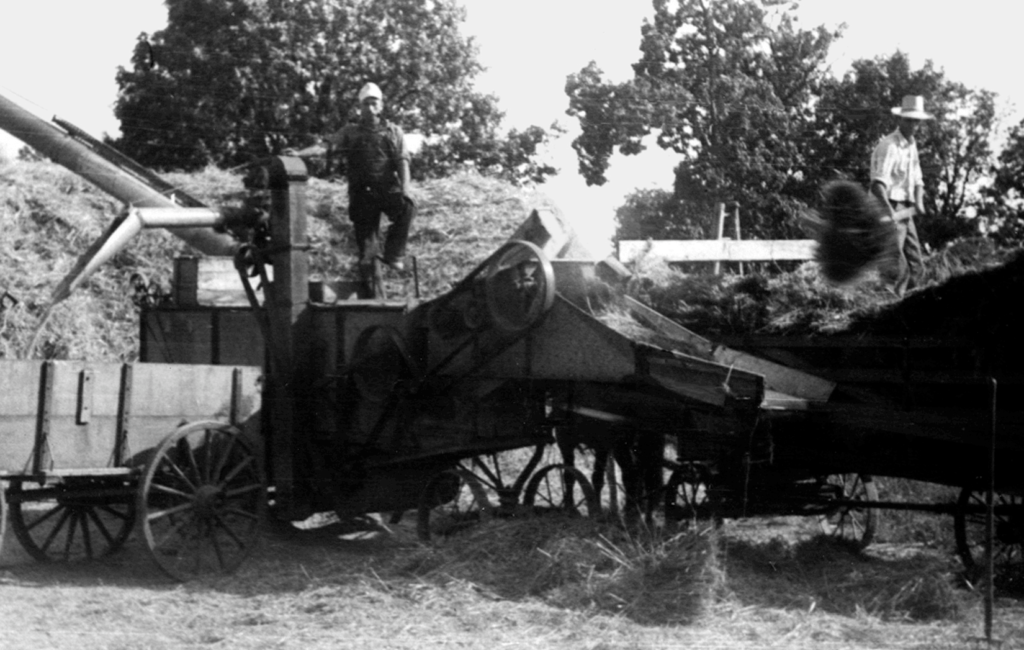
Three photos from the 1950’s showing oat thrashing on the Leo (Mike) Deleske farm.
For a large threshing ring there would be ten or twelve bundle haulers, three men in the straw stack, and three watching the oats wagon and scoop the grain in the granary. All the while the bundle haulers would feed into the threshing machine from both sides. There was also a man on the water wagon. The water wagon kept the boiler of the steam engine filled to produce power to the threshing machine.
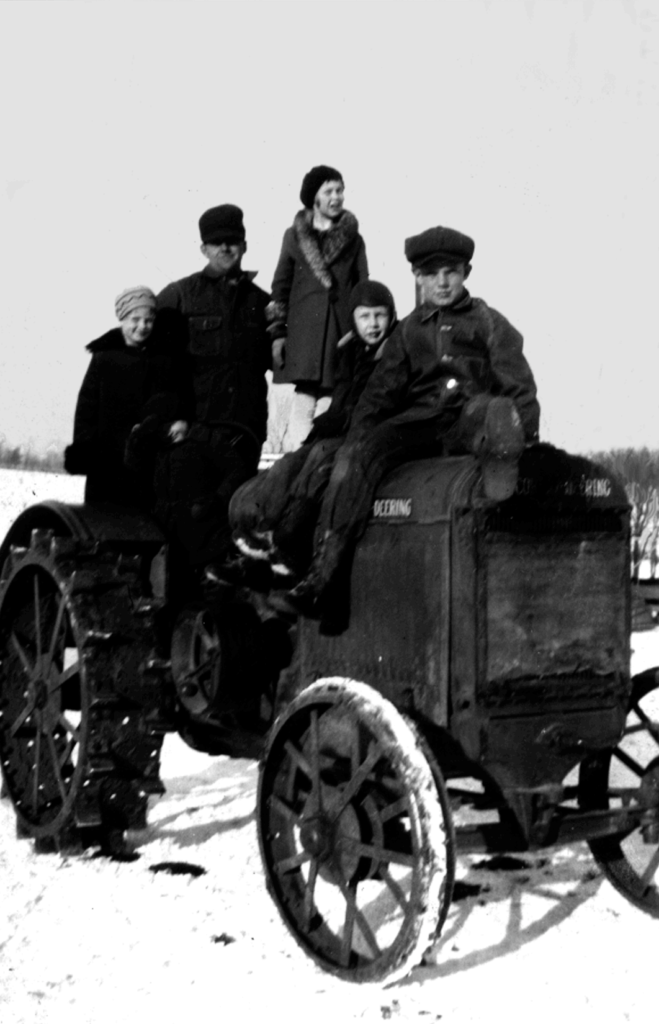
The farm tractor made a great deal of difference in the work load of the farmer. Above is the first tractor owned by Rex Folkerts, a McCormic Deering. Pictured are Luella Folkerts, John Frerichs, Sr. Louise Luiken, Ernest Luiken, and Harry Folkerts.
Each man took special pride in his team of horses. A young, well-broke, spirited team made the day and work easier. At noon, the team was unhitched and tied to the back of the wagons. They were fed grain from boxes built on the rear of the wagon.
Have you ever heard the expression, “eat like a thresher”? Well, food was plentiful and great. Lots of meat, potatoes, gravy , bread, vegetables, pies, and cakes, and lots of good coffee, milk and homemade lemonade.” This made it a busy time for women too. The farmers wives came to each home to prepare the noon and evening meals, as well as lunches.
Bob said, “And so it went taking turns until each farmer had his oats harvested and the straw stacked to use for the coming winter. Often men would compete to see who could haul the largest load, or who could get loaded and unloaded the quickest.”
This was hard dirty work, the days were long and they came during the hottest part of the summer.
When they shut down it was supper time, and another large meal was eaten. The day was still not over however. At ten o’clock at night the farmer would be back at home finishing up once more with livestock chores. This routine was continued until all of the farms in the ring were completed.
Bob Finger said, “When the threshing was finished, the farmers and their families would gather at Mike’s home to ‘settle-up’ (pay for the threshing.) After the meeting all would enjoy a special treat of cake and ice cream.”
Later, small threshing machines came into existence, along with trucks and tractors. Still later, the combine, took the place of threshing forever.
With all our modern conveniences, it is almost impossible to imagine what it was like to be a farmer before modern machinery.
Luella (Folkerts) Patterson wrote of her life on the farm of her parents near Steamboat Rock, where she grew up. Luella is the daughter of Rex and Minnie (Christians) Folkerts, and was born in 1921. Both of her parents were first generation Americans. Their parents had come here from Germany in the 1880’s.
Luella recalled: “As children we would play ball, handy Andy over a building, hide-and-go-seek and croquet. We had a barn with one roof higher than the other. I would throw the ball on the higher roof and it would bounce down to me. I did this many an evening. We went to the county fair, taking dinner along. In later years we went at night. In the winter, we would play hide the thimble, caroms, Chinese Checkers, and go ice skating or sledding.”
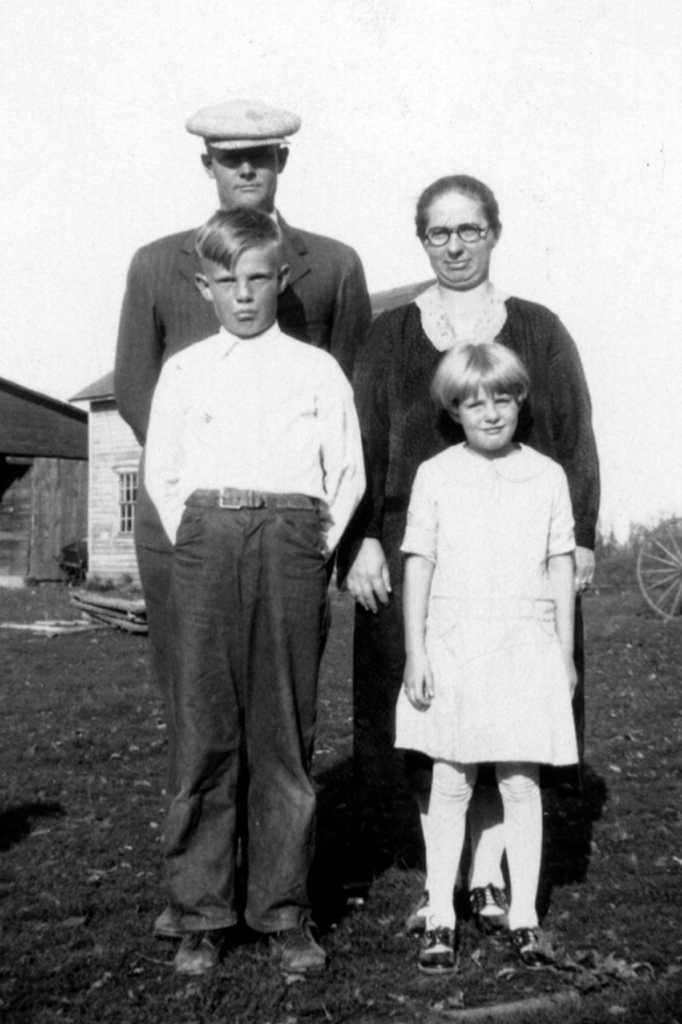
Rex, Minnie, Harry and Luella Folkerts around 1929. Another brother George, would be born two years later.
“I also had to help with the barn chores, getting cows from the pasture and putting them in the barn to be milked. In the winter they would have to be fed grain, and hay had to be thrown down from the mow. Little calves had to be fed. The milk had to be separated. I played with the kittens, and if there was a little time before milking, we would sit and crack hickory or walnuts.”
“I also carried enough water from the well to the house for the next day’s supply. There was a reservoir on the cook stove to fill and some for drinking and cooking.”
“In the winter I would carry split wood for the cook stove. In the summertime, I would pick up corncobs from the pig pen, for the cook stove. These made a quick fire and did not last as long. All our meals were made on the cook stove, and pies and cakes were baked in the oven. My favorite meal was fried potatoes, soft boiled eggs, and toast and jelly.”
“I drove the horses on the hay rope when we put hay in the barn.”
“I remember picking corn by hand. This was a hard and dirty job if it was hot. I remember Dad’s first tractor. His first corn picker was a time-saver.”
“In real cold weather I would have to build a fire in the furnace to take the chill off in the house. We slept in very cold rooms. I remember Harry and I would race to see who could undress the fastest and get into bed. I think Harry won the most. We would leave our clothes lay just like we took them off so we could step right into them the next morning. It was too cold to fool around.”
“My evenings were spent doing homework and playing caroms or Chinese Checkers with dad after he read the evening paper. Mother would sit and sew quilt blocks, embroidery, crochet, or mend clothes. In the daytime she would sew dresses for herself and I. In wintertime we would take quilts apart, wash the covers, and tie them back together.”
“In early spring we would get baby chicks, and I remember we would sit in the brooder house and observe those chicks. It was nice and warm, and at night the chicks would sit under the hood of the stove. When the chicks got big they learned to sit in trees, and we would have to gather them and put them in the hen house. Most of the roosters were sold and the hens were kept for laying eggs. Gathering the eggs was usually mothers job. She would go out twice each day.”
“In the summertime, after the dishes were done, we would sit on the porch talking, or lay in the grass looking at the stars. I remember seeing my first moon eclipse. It was a full eclipse. We also would visit neighbors or relatives. Bedtime was from 8:30 to 10:00.”
“On Saturday evening we would go to town for groceries, having a 24 dozen egg crate in between Harry and me, in the back seat. The first car we had did not have a trunk. We were nearly squashed. The second car was a Chevy, and it had a trunk. We sold the eggs to the grocery store for our groceries.”
From the turn of the century until the mid to late 1950’s the weekly shopping trip could be counted on as surely as attending church on Sunday.
Saturday was usually the day (actually they came in the evening) that everyone came into town and did their weekly shopping. Other than that many farmers never came into town during the week unless it was an emergency or they needed something to make a repair.
The general store was the busiest place in town on Saturday night, but the hardware, implement store, drug store, and others did a large portion of their business then as well. Even the doctor’s office was open on Saturday night.
On Saturday night, as soon as the evening chores were done, the farmer would load their family into the buggy, and later the family automobile, along with the weeks eggs, and head for town.
The mother had carefully prepared a grocery and sewing list during the previous week, and with it in hand the first stop would generally be the general store. In those days the customer usually did not go through the store and pick out their own merchandise, the list was given to a store clerk, and the clerk would gather the merchandise for the customer.
The list would be given to the clerk, and the eggs carried into the store. The eggs were bought by the store back then. They were taken to a back room to be candled and washed (the farmers were supposed to wash their eggs but often didn’t do a very good job). With the grocery list in the hand of the grocery clerk, the family would leave the store to take care of any other business that they might have in town.
At this point the family may split up, mother may go to the millinery store or doctor’s office. Father might go check on a harness at the harness shop, or visit the hardware for some nails or screws. He may even look at a new plow at the implement dealer. The children may or may not have a penny or even a nickel to spend on a bit of candy or a soft drink, or even some ice cream in later years. They may seek out friends for a game of tag or hide and seek. When mother and father’s business was all done they would find friends and neighbors and spend the rest of the evening visiting. In Steamboat Rock, the men in the ‘30’s and ‘40’s usually ended up in the implement store, lumber yard, or on various benches placed along the street.
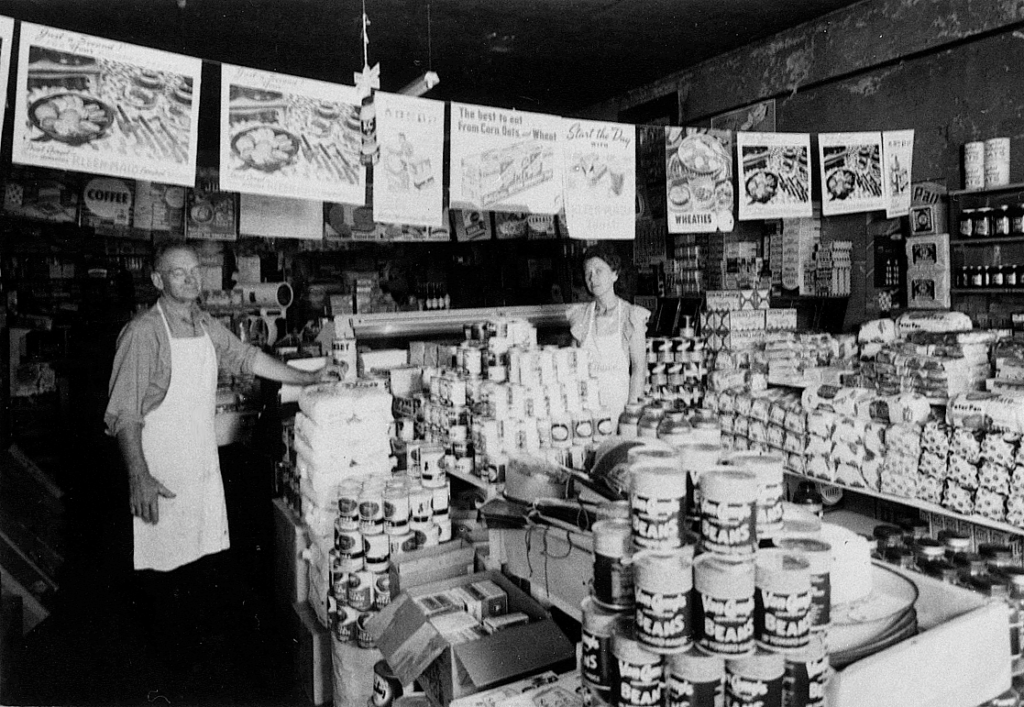
Inside Tom Ruppelt’s Meat Market. Pictured are Tom and Vera Okken. Tom operated his store assisted by his wife and son Bob along with Vera until he sold out to Roger and Meriem Gast in 1955.
The women sometimes spent the evening in the doctor’s waiting room just visiting, or on one of the many benches on the street.
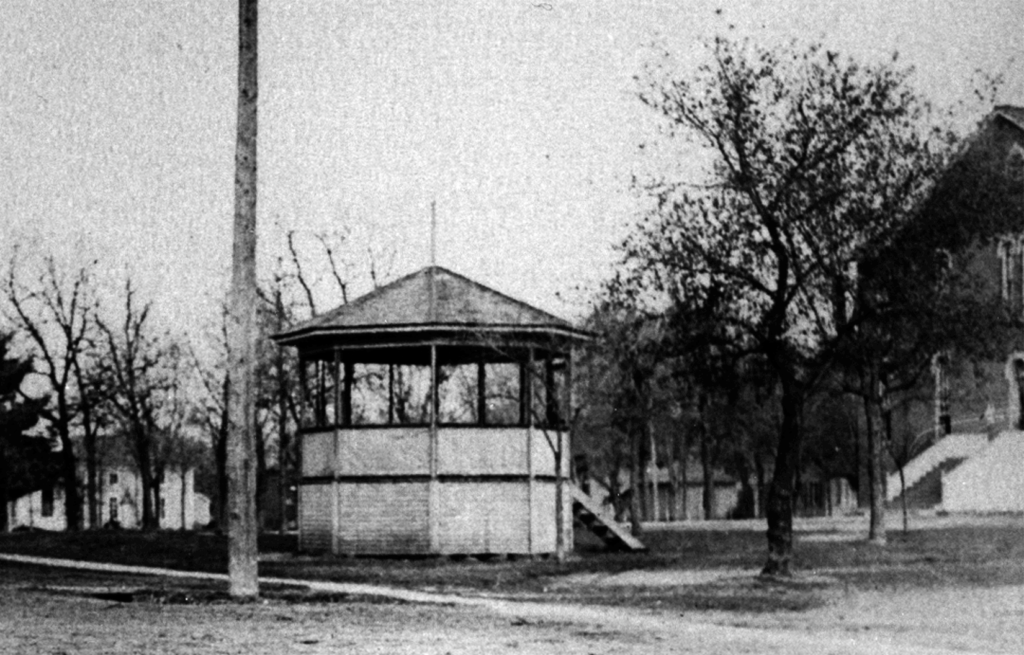
Band concerts were given on the school ground
For many years the high school gave a band concerts every Saturday night first on market street next to the hotel, and later in front of the school. Sometime between 10 o’clock and midnight, parents would begin to round up the family and head back to the general store to pick up their order. The children were excited knowing that Tom, (either Tom Eilers at Eilers store or Tom Ruppelt at his store) usually would drop a piece of candy of two in with the order and a treat for them. Their order was loaded and the family made their way home often after midnight.
You will notice no mention of payment for the order. That is because usually if the family had brought in eggs
(around twenty or thirty dozen) no money was exchanged until the end of the year. All through the year a tab was run by the storekeeper. He would write down everything he sold to the farmer, and how many eggs were brought in. At the end of the year they would settle their accounts. If the farmer’s chickens had laid well that year and the price had been good the farmer would receive a few dollars from the storekeeper. If the egg business was poor the farmer may owe the storekeeper some money.
Remember a grocery order of that day was far different than today. Many fruits and vegetables and potatoes were grown and canned at home. This goes for meat as well. Milk and eggs were plentiful, butter and even cheese was also made at home. Bread, cakes, cookies, and the like were baked at home.
The grocery list would commonly include such staples as follows:
salt, flour and sugar
coffee and tea
pepper and spices
dried beans or peas
baking soda
yeast
vinegar
Nonfood items included lamp wicks, oil or kerosene, fabric, buttons, thread, lye, etc.
There were no frozen pizza’s or even pizza mixes, or sauce. There were no TV dinners, burritos or chicken strips. No Minute Maid Orange Juice, and often no oranges.
There was an occasional banana, but no mangoes or kiwi fruit, no ice cream, no Heinz ketchup, no Chef Boy Ar Dee ravioli, and no Blue Bonnet.
One could not find Lemon Pledge, or Mr. Clean, or Clean Shower, most didn’t have a shower, inside.
They never heard of Spray and Wash. There was Babo, and Old Dutch Cleanser, and lots of elbow grease.
There was no such thing as hair spray, hair dye, and deodorant, even soap was made at home.
There was shaving soap, talcum powder, and mustache wax. The barber or drug store supplied these.
I cannot leave this section without mentioning the hired man. Hired men were part of the family.
During the winter farmers would keep an eye out for a good hired man. The search had no particular science to it. You “heard about” someone, or someone had worked for a neighbor, or a neighbor boy was ready to hire out. No advertising was done. The word just got around, and somehow a new hired man would be slated to appear on the scene about March 1.
When George Folkerts, (a German farmer who came to Steamboat Rock in the 1880’s) sold his farm and moved to town his youngest son Harm was not yet married. Harm went to live with his older brother Hie and worked for him as his hired man until he married.
Some men made a living as day laborers working out on farms as needed. They would help clean barns, put up hay, thrash, and pick or shell corn. Steamboat Rock had many a day laborer. Interestingly many of these men were married and for this reason could not live with a farmer. A great many were bachelors who simply chose not to live with a family.
Some men just came down the road looking for work. If the farmer needed a hand he would hire them. On occasion a man hired under these circumstances would stay on for several years.
Typically each spring there would be a new hired man who stayed at least through threshing. They were all single men. It was taken for granted that they would simply move in and become a part of the family. They shared family meals, the bathroom or the privy, reading the family newspapers, and listen to the family radio. Some farmers would have two men; during corn picking, maybe three.
There were some fine men who really became almost part of the family. But they were the exception. Some were real “characters.” Some would drop in asking for work who owned nothing but the clothes on their backs. These floaters were more likely to be the “extra hands” in the busy part of the season.
You can imagine those first meals when the family sat down at the table with a total stranger. There would be the silent ones and the talkers.
The ideal hired man was not only pleasant to have around the house, but was also good with horses, dependable, and could see things to do.
Another mark of a good hired man was one who could get up without being called. Chores and breakfast would take until 7 on most farms, then it was time to be heading for the field. There was an hour for dinner, then it would be fieldwork until supper then milking or vise-a-versa. And of course someone had to feed the teams. Most would knock off a little early on Saturday afternoon if they could. There were chores to do on Sunday too.
For years the standard rate of pay per month was low, plus board and room. No fringe benefits, no bonuses, no social security, no insurance came with it. Being a hired man, at a few dollars per month, was supposed to be the first step on the road to farm ownership. Hired man; then a renter; then an owner. More often than not it didn’t work out that way.
© 2020 Steamboat Rock Historical Society | All Rights Reserved
Powered by Hawth Productions, LLC